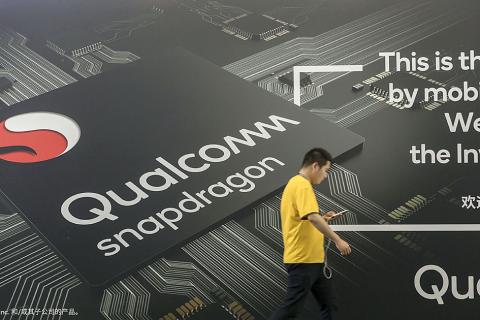Qualcomm Inc yesterday broke ground on a complex in Hsinchu to house its first overseas Center for Operations, Manufacturing Engineering and Testing (COMET), fulfilling the US company’s promise of investing US$700 million in Taiwan to settle an antitrust lawsuit with the Fair Trade Commission.
The building would also house a 5G testing lab, a multimedia research and development center, and a mobile artificial intelligence enablement center, the San Diego, California-based chipmaker said in a statement released yesterday.
The creation of the centers means that “the collaboration between Qualcomm and Taiwan’s ICT [information and communications technology] industry has marked a new milestone,” Qualcomm senior vice president of manufacturing technology and operations Roawen Chen (陳若文) said in the statement.

Photo: Bloomberg
The building would accommodate 10,000 staff upon its completion within two years, the statement said.
The centers, which are worth NT$5.5 billion (US$176.8 million), would provide comprehensive 5G testing services from sub-6 gigahertz technology and millimeter-wave technology, the Hsinchu City Government said in a separate statement.
In November last year, Qualcomm said that COMET and the 5G center would make Taiwan second in the world after Silicon Valley in ability to test the cutting-edge technologies.
“The Fair Trade Commission is pleased to see Qualcomm’s move to the Hsinchu Science Park [新竹科學園區],” commission Chairperson Huang Mei-ying (黃美瑛) said in Qualcomm’s statement.
“This is an important step by Qualcomm in boosting investment in Taiwan,” Huang added. “The investment will have a positive effect on Taiwan’s semiconductor and ICT industries, and companies in the supply chain.”
Based on the settlement reached in August last year, Qualcomm would no longer be required to pay the remainder of a NT$23.4 billion fine, after having already paid NT$2.73 billion.
Qualcomm has 700 employees in Taiwan.

The New Taiwan dollar is on the verge of overtaking the yuan as Asia’s best carry-trade target given its lower risk of interest-rate and currency volatility. A strategy of borrowing the New Taiwan dollar to invest in higher-yielding alternatives has generated the second-highest return over the past month among Asian currencies behind the yuan, based on the Sharpe ratio that measures risk-adjusted relative returns. The New Taiwan dollar may soon replace its Chinese peer as the region’s favored carry trade tool, analysts say, citing Beijing’s efforts to support the yuan that can create wild swings in borrowing costs. In contrast,

Nvidia Corp’s demand for advanced packaging from Taiwan Semiconductor Manufacturing Co (TSMC, 台積電) remains strong though the kind of technology it needs is changing, Nvidia CEO Jensen Huang (黃仁勳) said yesterday, after he was asked whether the company was cutting orders. Nvidia’s most advanced artificial intelligence (AI) chip, Blackwell, consists of multiple chips glued together using a complex chip-on-wafer-on-substrate (CoWoS) advanced packaging technology offered by TSMC, Nvidia’s main contract chipmaker. “As we move into Blackwell, we will use largely CoWoS-L. Of course, we’re still manufacturing Hopper, and Hopper will use CowoS-S. We will also transition the CoWoS-S capacity to CoWos-L,” Huang said

Nvidia Corp CEO Jensen Huang (黃仁勳) is expected to miss the inauguration of US president-elect Donald Trump on Monday, bucking a trend among high-profile US technology leaders. Huang is visiting East Asia this week, as he typically does around the time of the Lunar New Year, a person familiar with the situation said. He has never previously attended a US presidential inauguration, said the person, who asked not to be identified, because the plans have not been announced. That makes Nvidia an exception among the most valuable technology companies, most of which are sending cofounders or CEOs to the event. That includes

INDUSTRY LEADER: TSMC aims to continue outperforming the industry’s growth and makes 2025 another strong growth year, chairman and CEO C.C. Wei says Taiwan Semiconductor Manufacturing Co (TSMC, 台積電), a major chip supplier to Nvidia Corp and Apple Inc, yesterday said it aims to grow revenue by about 25 percent this year, driven by robust demand for artificial intelligence (AI) chips. That means TSMC would continue to outpace the foundry industry’s 10 percent annual growth this year based on the chipmaker’s estimate. The chipmaker expects revenue from AI-related chips to double this year, extending a three-fold increase last year. The growth would quicken over the next five years at a compound annual growth rate of 45 percent, fueled by strong demand for the high-performance computing